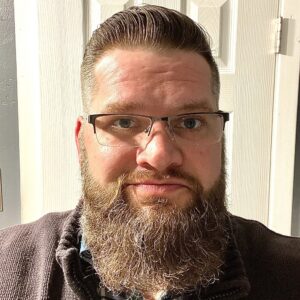Journeys to Humanism: A Quest for Truth, Meaning, and Authenticity

Journeys to Humanism, theHumanist.com’s regular series, features real stories from humanists in our community. From heartwarming narratives of growth, to more difficult journeys, our readers open up about their experiences coming to humanism.
Josh Kellar
Belton, TX, USA
My journey away from Christianity and towards humanism has been a profound and transformative experience, marked by significant shifts in my beliefs and understanding of the world.
Initially, I began moving away from Biblical literalism. Growing up, I was taught to accept the Bible as the infallible word of God, interpreting every story and command as absolute truth. However, as I delved deeper into the texts, I encountered contradictions and moral dilemmas that I couldn’t reconcile with a literal interpretation. This dissonance sparked a series of epistemological questions: How do we know what we know? What constitutes truth, and how can we be certain of it? These questions became a cornerstone of my journey, driving me to seek knowledge and understanding beyond the confines of religious doctrine.
As I questioned the foundations of my faith, I began to embrace the belief in the inherent, irrevocable worth of all people. This belief clashed with the notion of sacrificial substitutionary atonement, which posits that humanity is fundamentally flawed and requires redemption through Christ’s sacrifice. I found it increasingly difficult to accept that a loving deity would demand such a sacrifice, leading me to reject this doctrine and move away from belief in a literal Hell. The concept of eternal damnation seemed incompatible with the idea of a benevolent, just God.
This rejection naturally led me toward universalism, the belief that all souls are ultimately destined for salvation. It provided a more inclusive and compassionate perspective that resonated deeply with my growing sense of empathy and justice. Simultaneously, I began to adopt an anthropological understanding of scripture, viewing the Bible not as a divine mandate but as a collection of historical and cultural narratives shaped by human experiences and societal norms.
As I continued to evolve, I found myself moving away from the belief in a literal Heaven. The idea of an eternal paradise felt increasingly implausible and inconsistent with my understanding of human existence. This shift allowed me to let go of the need for everything to fit into a predetermined cosmic plan. Instead, I began to trust something internal, relying on my conscience and rationality to guide my actions and beliefs.
In this process, I discovered the importance of creating and discovering meaning in life. Without the framework of a supernatural being dictating my purpose, I found empowerment in the ability to define my own values and goals. This transition was both liberating and daunting, as it required me to take full responsibility for my choices and their consequences.
Ultimately, my journey led me away from faith in a supernatural being altogether. The more I questioned and explored, the less convincing the evidence for a deity became. I found greater coherence and fulfillment in a secular humanism worldview, which emphasizes the value and agency of human beings without relying on divine intervention. This perspective celebrates the potential for human growth, cooperation, and the pursuit of knowledge.
Embracing humanism has been a deeply enriching experience. It has allowed me to appreciate the complexity and beauty of life without the constraints of religious dogma. I now see morality as a human construct, grounded in our shared experiences and the innate worth of every individual. This shift has fostered a more inclusive, compassionate, and rational approach to understanding the world and my place in it.
In summary, my journey from Christianity to humanism has been a quest for truth, meaning, and authenticity. It has involved significant intellectual and emotional growth, moving away from rigid doctrines toward a more flexible and inclusive worldview. Through this process, I have learned to trust my inner wisdom, value the inherent worth of all people, and find meaning in the human experience. This path has led me to embrace secular humanism, where I find greater coherence, fulfillment, and a profound sense of connection to humanity.
We all have our own stories of how we came to be humanists, and we want to hear yours! Fill out the form here to be featured in this series. You can also share your journey and chat with others on the Journeys to Humanism channel on the AHA’s Discord Server.
